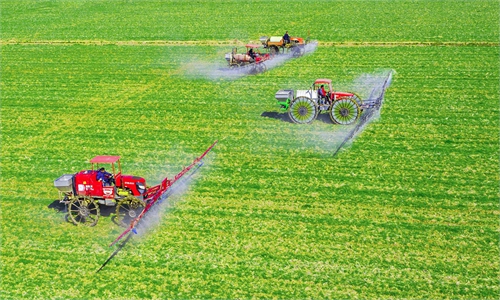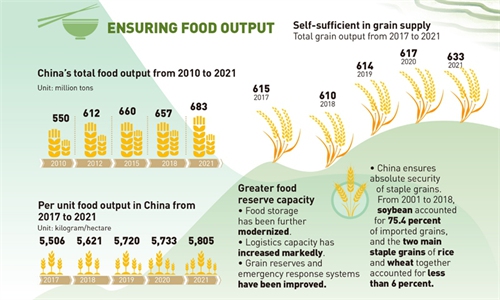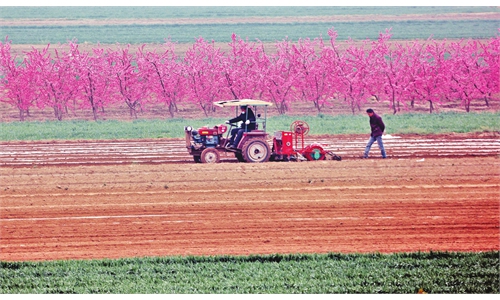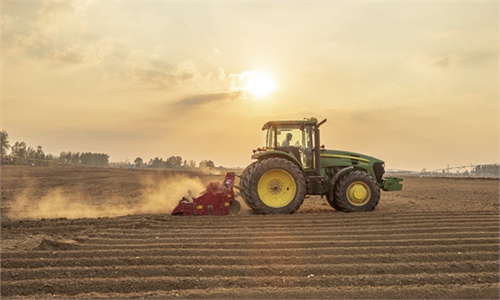GT Investigates: Western media bad-mouths China’s food security amid Ukraine crisis, while blaming Chinese for global supply strain
Editor's Note:
As a country with a population of approximately 1.4 billion, China attaches great importance to food security.
The conflict between Russia and Ukraine has pushed up food and fertilizer prices, and some impacts on global grain supplies have been witnessed. Though China has assured its food security, some foreign media outlets took this opportunity to falsely claim that China will face grain shortages, to stoke anxiety and blame China for the tension in Ukraine.
Who is hyping China's supposed food issue? Are China's grain production and supplies safe enough? How will China guarantee its food supply?
The Global Times will present three investigative reports in the coming days. This is the first installment.
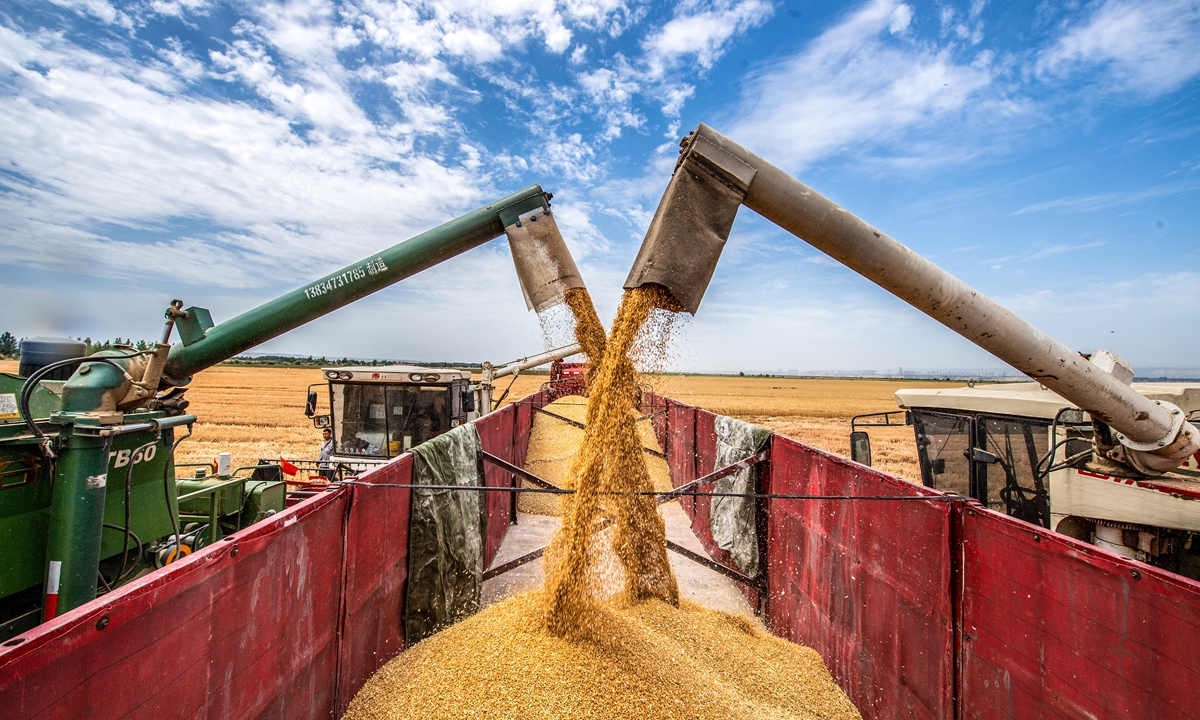
Food security has become a fresh topic used by some Western media outlets to smear China, as the conflict between Russia and Ukraine has, to some degree, caused a grain price increase and challenged grain supplies globally.
Such narratives as presented by these media outlets on China's food supply security claim China faces "extreme shortage in food," "rising imports of grains," and even "toxic soil" and "frequent natural disasters," drawing a conclusion that China's food supply is severely insecure.
However, upon closer inspection, it is not hard to find that these claims are baseless. Moreover, the media outlets making such arguments are some "familiar faces," who frequently smear China on various other issues and live on it.
Experts pointed out that such smear tactics are "in accordance with the US' efforts to expand the Western countries' hostility against Russia to China."
Minister of Agriculture and Rural Affairs Tang Renjian said in early March during the two sessions that, at present, China's total grain supply is abundant, and the per capita grain possession is 483 kilograms, an increase of 9 kilograms over 2021's 474 kilograms.
"No matter how the international situation changes, we have the ability to ensure that more than 1.4 billion people have meals on time every day without starving, and they will eat better and better," he noted.
Creating crises without a basis
In a latest report, VOA claimed on March 16 that the Russia-Ukraine conflict has pushed up global prices of wheat and other commodities, which it said may worsen China's food shortage.
TFI Global, owned by anti-China Indian media group The Frustrated Indian (TFI), described itself as "the first news team from around the world to tell you that China was reeling under an intense food crisis," and attributed the "food crisis" to China's "toxic soil" and "frequent natural disasters."
"Nobody wants to be a farmer in China... Returns are low and crop yields hardly make agriculture a viable career option for Chinese citizens. Additionally, people from rural China are migrating to urban centers in search of better livelihoods," TFI Global asserted.
CNN, however, linked the alleged food shortages to China's strict COVID-19 containment measures, saying that strict prevention and control of the epidemic has led to a higher cost of food and disrupted food supplies.
Observers pointed out that some foreign media agencies have even gone to the extent of fabricating data around the alleged food shortage.
Japan-based Nikkei Asia, for example, claimed that in order to alleviate the food crisis, China is importing large amounts of food and hoarding it, pushing up global prices and even causing famine in some countries. TFI even declared that China is "leading the crusade in establishing this hegemonic food disparity."
CNN concluded that China's food crisis has sparked anxiety and distrust of the government in China, based on a November 2021 notice from China's Ministry of Commerce which suggested households to stockpile a certain amount of necessities. Some media outlets asserted the Chinese government's attempt to head off concerns about pricing and supply appears to be "spiraling out of control."
The Russia-Ukraine conflict has inadvertently increased food prices in the international market, but that will only have a slight impact on the Chinese domestic market, noted Li Guoxiang, a research fellow at the Rural Development Institute under the Chinese Academy of Social Sciences. "Soybean and wheat are two main food crops that China imports, most of which are imported from American regions instead of Russia or Ukraine," Li told the Global Times.
Li said that China actually has no shortage of wheat as a food staple. The various kinds of wheat it imports are for varied and special uses, such as making bread and steamed buns. "It's a natural result of the improvement of our people's living standards."
Palm oil, which accounts for nearly half of all humanly-consumable oil China imports, is also from Southeast Asia. Imported soybeans, many of which are also for cooking oil extraction, are mainly from American countries including the US and Brazil, Li added.
The rise in prices of agricultural supplies such as fertilizers in the Chinese market, which some Western media outlets highlighted in recent days, is not only caused by fluctuations in the international market, but also by China's voluntary reduction of fertilizer production, said rice expert Li Ganghua, a professor at the College of Agriculture under Nanjing Agricultural University (NAU).
"China has taken the initiative to cut down fertilizer production for the sake of environmental protection and emission reduction," Li Ganghua told the Global Times. Apart from importing fertilizer (to lower its market price), China is also making technical innovations to replace certain raw materials with more eco-friendly ones, he added.
Experts reached by the Global Times also refuted TFI's assertion that "no one in China wants to be a farmer."
Growing grain may not have been profitable in China in the past, but the situation has largely improved in the last couple of years due to the increase in the procurement price, and the government's supportive policies, Li Guoxiang said.
"For example, farmers in Northeast China told me that planting corn can bring them 1,700 to 1,800 yuan ($267-283) per mu, and the planting cost is only 400 to 500 yuan per mu," Li Guoxiang recalled. "They said now they scramble to growing grain."
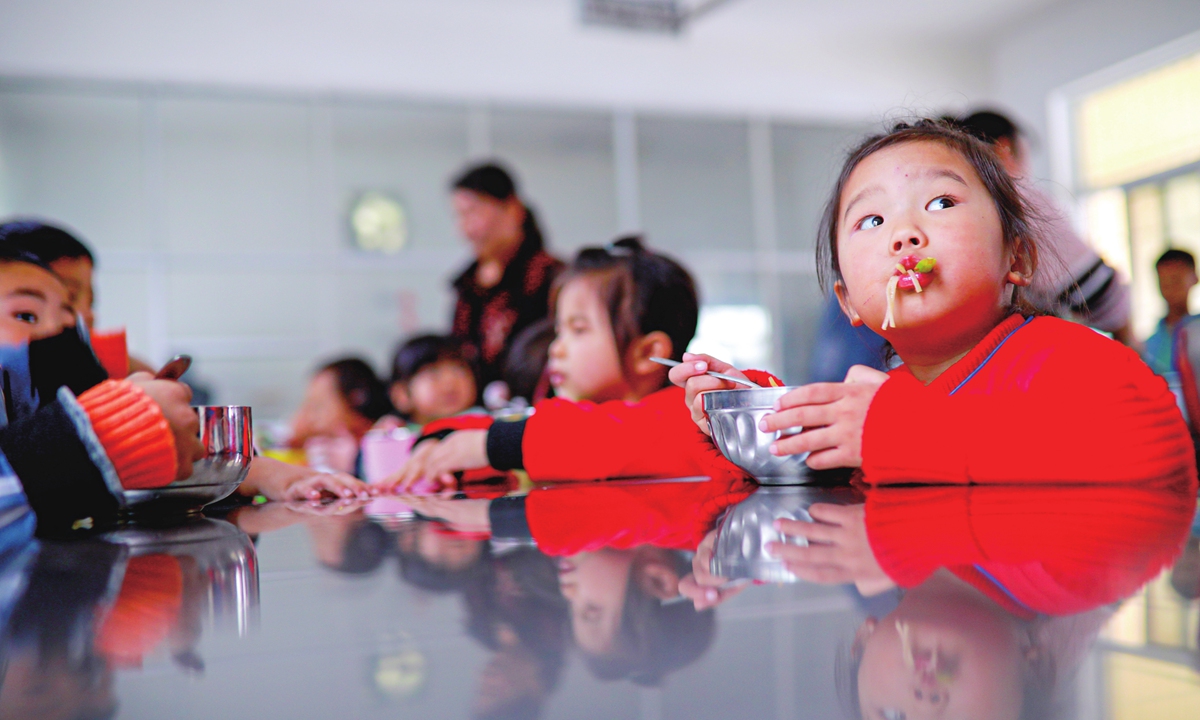
Wrong targets
These media outlets simply used any topic they could find to smear China or hype the "China threat" theory as they have a deep-rooted prejudice and hostility toward China, Liu Weidong, a research fellow at the Institute of American Studies at the Chinese Academy of Social Sciences, told the Global Times.
They would interpret anything concerning China from a negative perspective no matter whether China has done it or not, and no matter how far-fetched the "evidence" is, Liu said.
China's import of grains is not only for supplementing its domestic consumption, said Li Guoxiang. It's also an effort by China to promote the stability of the international market and encourage a trade balance, especially with the countries with which China has a huge trade surplus, such as the US, he said.
"China makes an effort to well implement the bilateral relations," Li Guoxiang told the Global Times. "But sadly, they [the US-led West] always have a lot to say on that - when we import more grains, they say we have a food security crisis; when we buy less, they say we advocate for trade protectionism."
In a VOA report on March 16, an "expert" from Taiwan island said there were reports on Chinese social media platforms by the end of 2021, which said that some local governments on the Chinese mainland were encouraging residents to hoard food. The "expert" claimed that in retrospect, that move "maybe indicates that China knew that Russia would launch a war on Ukraine as early as 2021 and started to ask residents to hoard food in case of a food crisis following the war."
Such speech is clearly intended to give voice to a conspiracy theory that China had been informed in advance and acquiesced to Russia's military action in Ukraine. Such claim is in accordance with the US' efforts to blame China for the Russia-Ukraine conflict and expand the Western countries hostility against Russia to China, according to Liu.
However, analysts pointed out that it is the West, and especially the US, that should be principally held responsible for the Russia-Ukraine conflict, which has escalated to a huge humanitarian crisis, including a global food crisis.
Armenia, Mongolia, Kazakhstan, and Eritrea import virtually all of their wheat from Russia and Ukraine and must now find new sources. But they are competing against much larger buyers, including Turkey, Egypt, Bangladesh, and Iran, which source more than 60 percent of their wheat from Russia and Ukraine, The New York Times reported.
Nooruddin Zaker Ahmadi, director of the Bashir Navid Complex, an Afghan imports company, told The New York Times that "the United States thinks it has only sanctioned Russia and its banks, but the United States has sanctioned the whole world."
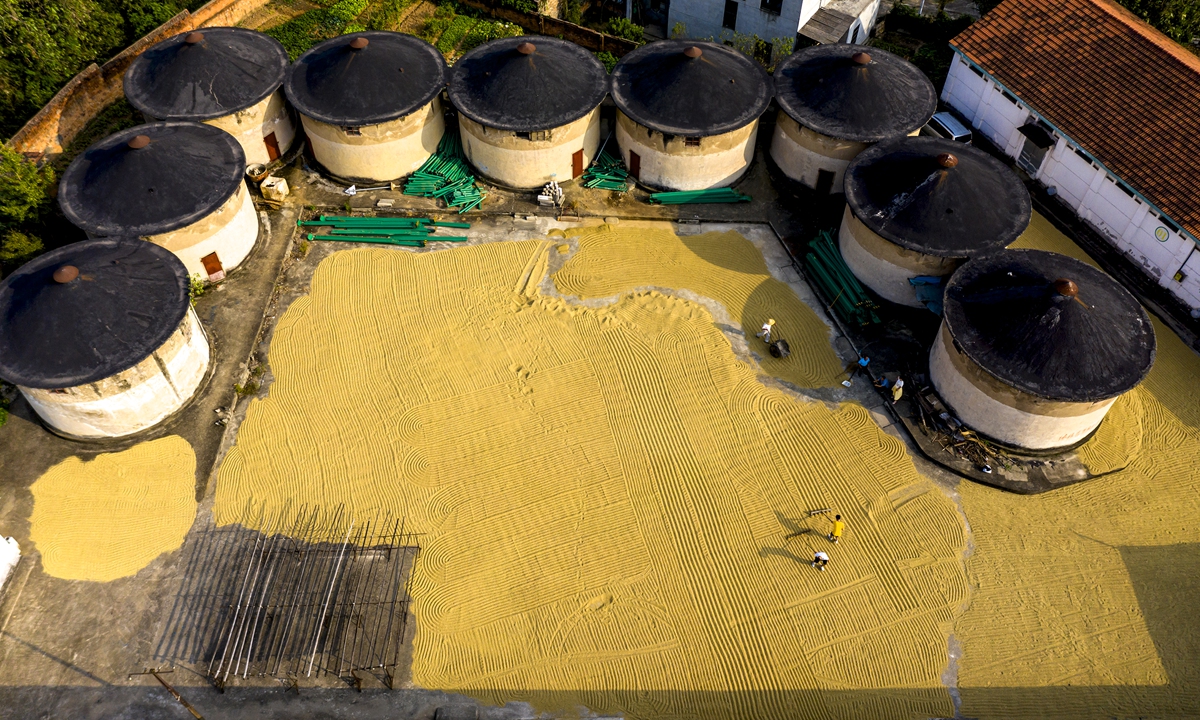
Is China really facing a food crisis?
There's no need to be overly concerned about "food crisis," which is actually nonexistent in China, agriculture scholars and industry insiders told the Global Times.
Li Guoxiang estimates that China's grain cultivation areas will increase to some 1.8 billion mu by the end of this year from the 1.76 billion mu in 2021, thanks to favorable procurement prices and the government's supportive policies."
China's grain output reached a record high of 682.85 million tons in 2021, according to the country's statistics bureau, exceeding 650 million tons for the seventh consecutive year, according to the "No.1 central document."
In 2019, China's per capita grain yield reached about 470 kilograms, far higher than the international food security standard of 400 kilograms per person, according to yicai.com
Governmental policies have also encouraged insurance for food security. China unveiled a master plan for the modernization of the agricultural sector and rural areas through 2025, as the government ratcheted up measures to ensure food security, help farmers bolster incomes, and consolidate the outcomes of its poverty reduction campaign, according to the Chinese government.
Globally, the conflict between Russia and Ukraine will definitely lead to grain supply problems, said Li Guoxiang. Although the conflict doesn't largely affect the Chinese domestic market at present, he said that China can try its best in containing the possible risk.
"What we can do is optimize cultivation areas, such as increasing soybean cultivation areas in Northeast China, and further improve the enthusiasm of our grain farmers, like raising the procurement price of rice," he suggested.
Moreover, China is also helping other countries bolster their food supplies. The country decided to provide 2,000 tons of rice as emergency food aid to Sri Lanka, said the Chinese embassy on March 26.
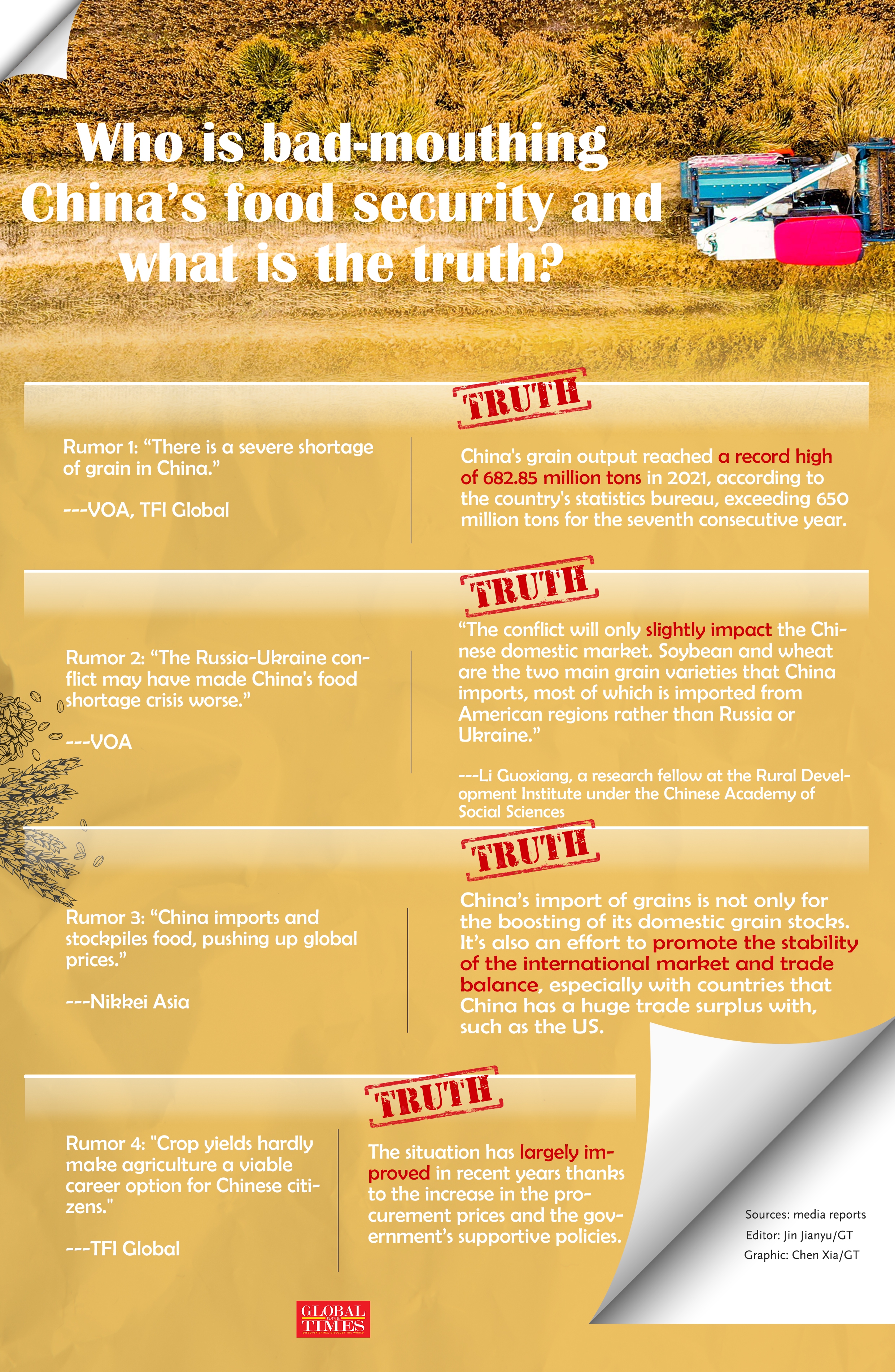
As a country with a population of approximately 1.4 billion, China attaches great importance to food security.
The conflict between Russia and Ukraine has pushed up food and fertilizer prices, and some impacts on global grain supplies have been witnessed. Though China has assured its food security, some foreign media outlets took this opportunity to falsely claim that China will face grain shortages, to stoke anxiety and blame China for the tension in Ukraine.
Who is hyping China's supposed food issue? Are China's grain production and supplies safe enough? How will China guarantee its food supply?
The Global Times will present three investigative reports in the coming days. This is the first installment.

Wheat harvest in Yuncheng, North China's Shanxi Province in June 2020 Photo: VCG
Food security has become a fresh topic used by some Western media outlets to smear China, as the conflict between Russia and Ukraine has, to some degree, caused a grain price increase and challenged grain supplies globally.
Such narratives as presented by these media outlets on China's food supply security claim China faces "extreme shortage in food," "rising imports of grains," and even "toxic soil" and "frequent natural disasters," drawing a conclusion that China's food supply is severely insecure.
However, upon closer inspection, it is not hard to find that these claims are baseless. Moreover, the media outlets making such arguments are some "familiar faces," who frequently smear China on various other issues and live on it.
Experts pointed out that such smear tactics are "in accordance with the US' efforts to expand the Western countries' hostility against Russia to China."
Minister of Agriculture and Rural Affairs Tang Renjian said in early March during the two sessions that, at present, China's total grain supply is abundant, and the per capita grain possession is 483 kilograms, an increase of 9 kilograms over 2021's 474 kilograms.
"No matter how the international situation changes, we have the ability to ensure that more than 1.4 billion people have meals on time every day without starving, and they will eat better and better," he noted.
Creating crises without a basis
In a latest report, VOA claimed on March 16 that the Russia-Ukraine conflict has pushed up global prices of wheat and other commodities, which it said may worsen China's food shortage.
TFI Global, owned by anti-China Indian media group The Frustrated Indian (TFI), described itself as "the first news team from around the world to tell you that China was reeling under an intense food crisis," and attributed the "food crisis" to China's "toxic soil" and "frequent natural disasters."
"Nobody wants to be a farmer in China... Returns are low and crop yields hardly make agriculture a viable career option for Chinese citizens. Additionally, people from rural China are migrating to urban centers in search of better livelihoods," TFI Global asserted.
CNN, however, linked the alleged food shortages to China's strict COVID-19 containment measures, saying that strict prevention and control of the epidemic has led to a higher cost of food and disrupted food supplies.
Observers pointed out that some foreign media agencies have even gone to the extent of fabricating data around the alleged food shortage.
Japan-based Nikkei Asia, for example, claimed that in order to alleviate the food crisis, China is importing large amounts of food and hoarding it, pushing up global prices and even causing famine in some countries. TFI even declared that China is "leading the crusade in establishing this hegemonic food disparity."
CNN concluded that China's food crisis has sparked anxiety and distrust of the government in China, based on a November 2021 notice from China's Ministry of Commerce which suggested households to stockpile a certain amount of necessities. Some media outlets asserted the Chinese government's attempt to head off concerns about pricing and supply appears to be "spiraling out of control."
The Russia-Ukraine conflict has inadvertently increased food prices in the international market, but that will only have a slight impact on the Chinese domestic market, noted Li Guoxiang, a research fellow at the Rural Development Institute under the Chinese Academy of Social Sciences. "Soybean and wheat are two main food crops that China imports, most of which are imported from American regions instead of Russia or Ukraine," Li told the Global Times.
Li said that China actually has no shortage of wheat as a food staple. The various kinds of wheat it imports are for varied and special uses, such as making bread and steamed buns. "It's a natural result of the improvement of our people's living standards."
Palm oil, which accounts for nearly half of all humanly-consumable oil China imports, is also from Southeast Asia. Imported soybeans, many of which are also for cooking oil extraction, are mainly from American countries including the US and Brazil, Li added.
The rise in prices of agricultural supplies such as fertilizers in the Chinese market, which some Western media outlets highlighted in recent days, is not only caused by fluctuations in the international market, but also by China's voluntary reduction of fertilizer production, said rice expert Li Ganghua, a professor at the College of Agriculture under Nanjing Agricultural University (NAU).
"China has taken the initiative to cut down fertilizer production for the sake of environmental protection and emission reduction," Li Ganghua told the Global Times. Apart from importing fertilizer (to lower its market price), China is also making technical innovations to replace certain raw materials with more eco-friendly ones, he added.
Experts reached by the Global Times also refuted TFI's assertion that "no one in China wants to be a farmer."
Growing grain may not have been profitable in China in the past, but the situation has largely improved in the last couple of years due to the increase in the procurement price, and the government's supportive policies, Li Guoxiang said.
"For example, farmers in Northeast China told me that planting corn can bring them 1,700 to 1,800 yuan ($267-283) per mu, and the planting cost is only 400 to 500 yuan per mu," Li Guoxiang recalled. "They said now they scramble to growing grain."

Children have lunch at a kindergarten in Shangluo, Northwest China's Shaanxi Province. Photo: VCG
Wrong targets
These media outlets simply used any topic they could find to smear China or hype the "China threat" theory as they have a deep-rooted prejudice and hostility toward China, Liu Weidong, a research fellow at the Institute of American Studies at the Chinese Academy of Social Sciences, told the Global Times.
They would interpret anything concerning China from a negative perspective no matter whether China has done it or not, and no matter how far-fetched the "evidence" is, Liu said.
China's import of grains is not only for supplementing its domestic consumption, said Li Guoxiang. It's also an effort by China to promote the stability of the international market and encourage a trade balance, especially with the countries with which China has a huge trade surplus, such as the US, he said.
"China makes an effort to well implement the bilateral relations," Li Guoxiang told the Global Times. "But sadly, they [the US-led West] always have a lot to say on that - when we import more grains, they say we have a food security crisis; when we buy less, they say we advocate for trade protectionism."
In a VOA report on March 16, an "expert" from Taiwan island said there were reports on Chinese social media platforms by the end of 2021, which said that some local governments on the Chinese mainland were encouraging residents to hoard food. The "expert" claimed that in retrospect, that move "maybe indicates that China knew that Russia would launch a war on Ukraine as early as 2021 and started to ask residents to hoard food in case of a food crisis following the war."
Such speech is clearly intended to give voice to a conspiracy theory that China had been informed in advance and acquiesced to Russia's military action in Ukraine. Such claim is in accordance with the US' efforts to blame China for the Russia-Ukraine conflict and expand the Western countries hostility against Russia to China, according to Liu.
However, analysts pointed out that it is the West, and especially the US, that should be principally held responsible for the Russia-Ukraine conflict, which has escalated to a huge humanitarian crisis, including a global food crisis.
Armenia, Mongolia, Kazakhstan, and Eritrea import virtually all of their wheat from Russia and Ukraine and must now find new sources. But they are competing against much larger buyers, including Turkey, Egypt, Bangladesh, and Iran, which source more than 60 percent of their wheat from Russia and Ukraine, The New York Times reported.
Nooruddin Zaker Ahmadi, director of the Bashir Navid Complex, an Afghan imports company, told The New York Times that "the United States thinks it has only sanctioned Russia and its banks, but the United States has sanctioned the whole world."

Harvest in Daye, Central China's Hubei Province in October 2021. Photo: VCG
Is China really facing a food crisis?
There's no need to be overly concerned about "food crisis," which is actually nonexistent in China, agriculture scholars and industry insiders told the Global Times.
Li Guoxiang estimates that China's grain cultivation areas will increase to some 1.8 billion mu by the end of this year from the 1.76 billion mu in 2021, thanks to favorable procurement prices and the government's supportive policies."
China's grain output reached a record high of 682.85 million tons in 2021, according to the country's statistics bureau, exceeding 650 million tons for the seventh consecutive year, according to the "No.1 central document."
In 2019, China's per capita grain yield reached about 470 kilograms, far higher than the international food security standard of 400 kilograms per person, according to yicai.com
Governmental policies have also encouraged insurance for food security. China unveiled a master plan for the modernization of the agricultural sector and rural areas through 2025, as the government ratcheted up measures to ensure food security, help farmers bolster incomes, and consolidate the outcomes of its poverty reduction campaign, according to the Chinese government.
Globally, the conflict between Russia and Ukraine will definitely lead to grain supply problems, said Li Guoxiang. Although the conflict doesn't largely affect the Chinese domestic market at present, he said that China can try its best in containing the possible risk.
"What we can do is optimize cultivation areas, such as increasing soybean cultivation areas in Northeast China, and further improve the enthusiasm of our grain farmers, like raising the procurement price of rice," he suggested.
Moreover, China is also helping other countries bolster their food supplies. The country decided to provide 2,000 tons of rice as emergency food aid to Sri Lanka, said the Chinese embassy on March 26.

Who is bad-mouthing China's food security and what is the truth? Infographic: Chen Xia/GT
